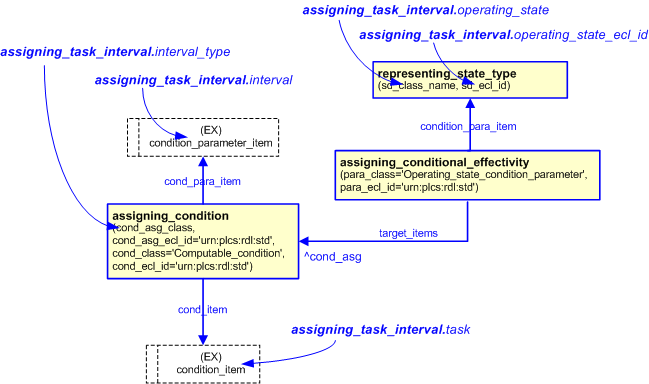Template:— assigning_task_interval (asg_task_intvl)
Context:— NOLITO |
Date: 2008/05/06 14:07:06
Revision: 1.1
|
This section specifies the template assigning_task_interval.
NOTE
The template has been defined in the context of
NOLITO.
Refer to the business context for details of related templates.
NOTE
An explanation of a template and the associated instantiation path is
provided in the
Template overview
section.
This template describes how to represent a task interval, and the operational status for which the interval is effective.
The EXPRESS-G diagram in
Figure
1
shows the templates and EXPRESS entities that are required
to represent the template
"assigning_task_interval".
The text highlighted in blue shows the template parameters.
Figure 1 — An EXPRESS-G representation of the Information model for assigning_task_interval
The graphic for the template to be used in other EXPRESS-G diagrams
is shown in Figure
2
below.
Figure 2 — The graphical representation of the assigning_task_interval template
The following input parameters are defined for this template:
Name of the External_class that defines the type of task interval (scheduled, event_based or unknown).
The following classes and their sub-classes can be used:
Name of the External_class that defines the operating state for which the task interval is effective (in storage,
in operation, or total).
The following classes and their sub-classes can be used:
Name of the External_class_library in which the Extarnal_class given for the operating_state is defined.
The entity to which the task interval is being assigned.
The entity which defines the task interval.
The instantiation path shown below specifies the entities that are to be
instantiated by the template.
A description of templates and the syntax for the instantiation path is
provided in the
Templates Help/Information section.
Identification_assignment-- Mark the Identification_assignment entity as -- referable when this template is used by binding it to the reference -- parameter id_assgn %^id_assgn =
Identification_assignment%
![[warning:]]() Error P8: the template assigning_task_interval does not have a parameter name [id].Identification_assignment.identifier
Error P8: the template assigning_task_interval does not have a parameter name [id].Identification_assignment.identifier =
@idIdentification_assignment.role = '/IGNORE'
Identification_assignment.description = '/NULL'
![[warning:]]() Error P4: the template assigning_task_interval does not have a parameter name [items].Identification_assignment.items
Error P4: the template assigning_task_interval does not have a parameter name [items].Identification_assignment.items ->
@items-- provide the role of the identification by classifying the Identification_assignment /
assigning_reference_data(
items=^id_assgn,
class_name=@id_class_name,
ecl_id=@id_ecl_id)/
![[warning:]]() Error t3: the template assigning_task_interval does not have a parameter name [id_class_name]. Parameters are: interval_type
operating_state operating_state_ecl_id task interval items class_name ecl_id
Error t3: the template assigning_task_interval does not have a parameter name [id_class_name]. Parameters are: interval_type
operating_state operating_state_ecl_id task interval items class_name ecl_id![[warning:]]() Error t3: the template assigning_task_interval does not have a parameter name [id_ecl_id]. Parameters are: interval_type
operating_state operating_state_ecl_id task interval items class_name ecl_id-- assign an organization to the identifier and classify it as 'Owner_of'
Error t3: the template assigning_task_interval does not have a parameter name [id_ecl_id]. Parameters are: interval_type
operating_state operating_state_ecl_id task interval items class_name ecl_id-- assign an organization to the identifier and classify it as 'Owner_of' /
assigning_organization(
items=^id_assgn,
org_id=@org_id,
org_id_class_name=@org_id_class_name,
org_id_ecl_id=@org_id_ecl_id,
org_assgn_class_name='Owner_of',
org_assgn_ecl_id='urn:plcs:rdl:std')/
![[warning:]]() Error t3: the template assigning_task_interval does not have a parameter name [org_id]. Parameters are: interval_type operating_state
operating_state_ecl_id task interval items class_name ecl_id
Error t3: the template assigning_task_interval does not have a parameter name [org_id]. Parameters are: interval_type operating_state
operating_state_ecl_id task interval items class_name ecl_id![[warning:]]() Error t3: the template assigning_task_interval does not have a parameter name [org_id_class_name]. Parameters are: interval_type
operating_state operating_state_ecl_id task interval items class_name ecl_id
Error t3: the template assigning_task_interval does not have a parameter name [org_id_class_name]. Parameters are: interval_type
operating_state operating_state_ecl_id task interval items class_name ecl_id![[warning:]]() Error t3: the template assigning_task_interval does not have a parameter name [org_id_ecl_id]. Parameters are: interval_type
operating_state operating_state_ecl_id task interval items class_name ecl_id
Error t3: the template assigning_task_interval does not have a parameter name [org_id_ecl_id]. Parameters are: interval_type
operating_state operating_state_ecl_id task interval items class_name ecl_id
The following entities are instantiated with attributes as specified:
The instance diagram in Figure
3
shows an example of the EXPRESS entities and templates that are instantiated by the template:
/assigning_task_interval(items='#1', class_name='Safety_critical', ecl_id='urn:plcs:rdl:std')/
(an illustration of the consolidated assigning_task_interval template is shown in
Figure
4 below.)
Figure 3 — Entities instantiated by assigning_task_interval template
The instance diagram in
Figure
4
shows the graphic symbol for the template that is to be
used in other instance diagrams. The example template is:
/assigning_task_interval(items='#1', class_name='Safety_critical', ecl_id='urn:plcs:rdl:std')/
Figure 4 — Instantiation of assigning_task_interval template
Characterizations
No common characterizations of the template
assigning_task_interval
have been identified. However, the ISO 10303-239 EXPRESS model
may enable other assignments to the entities instantiated by the template.




